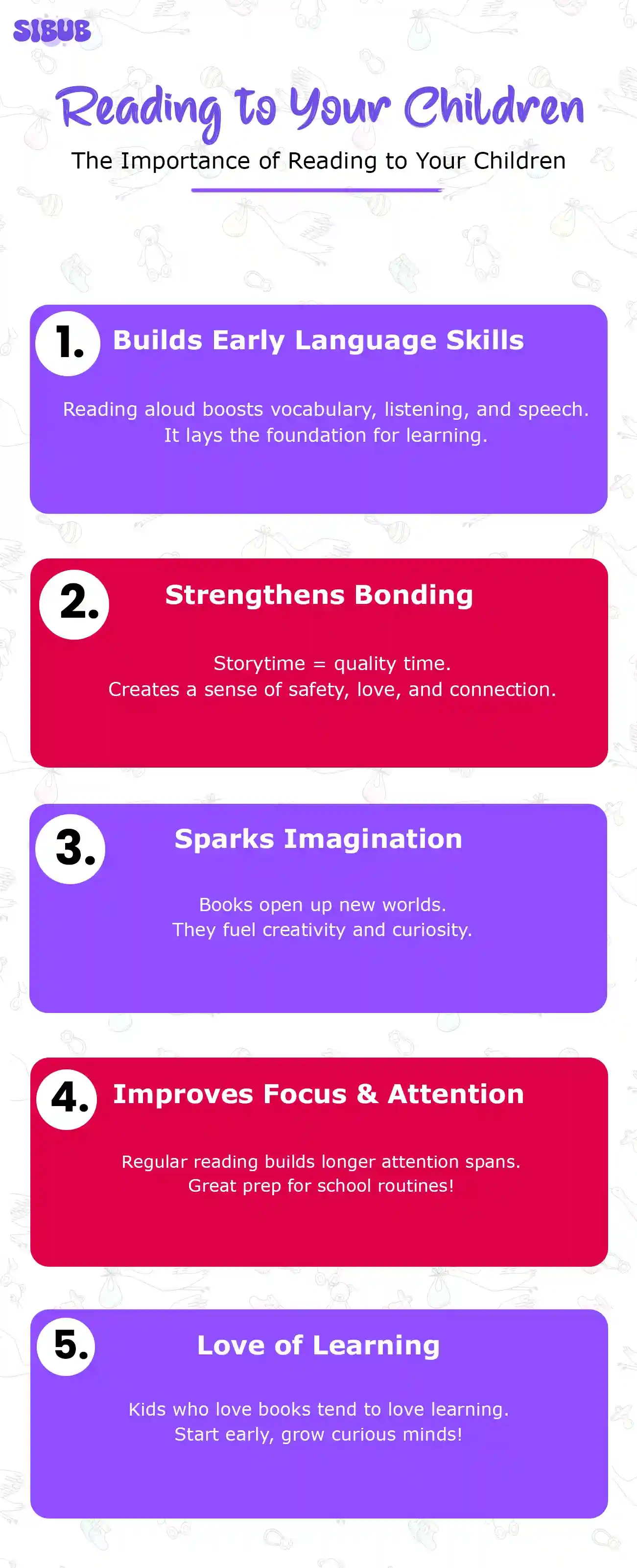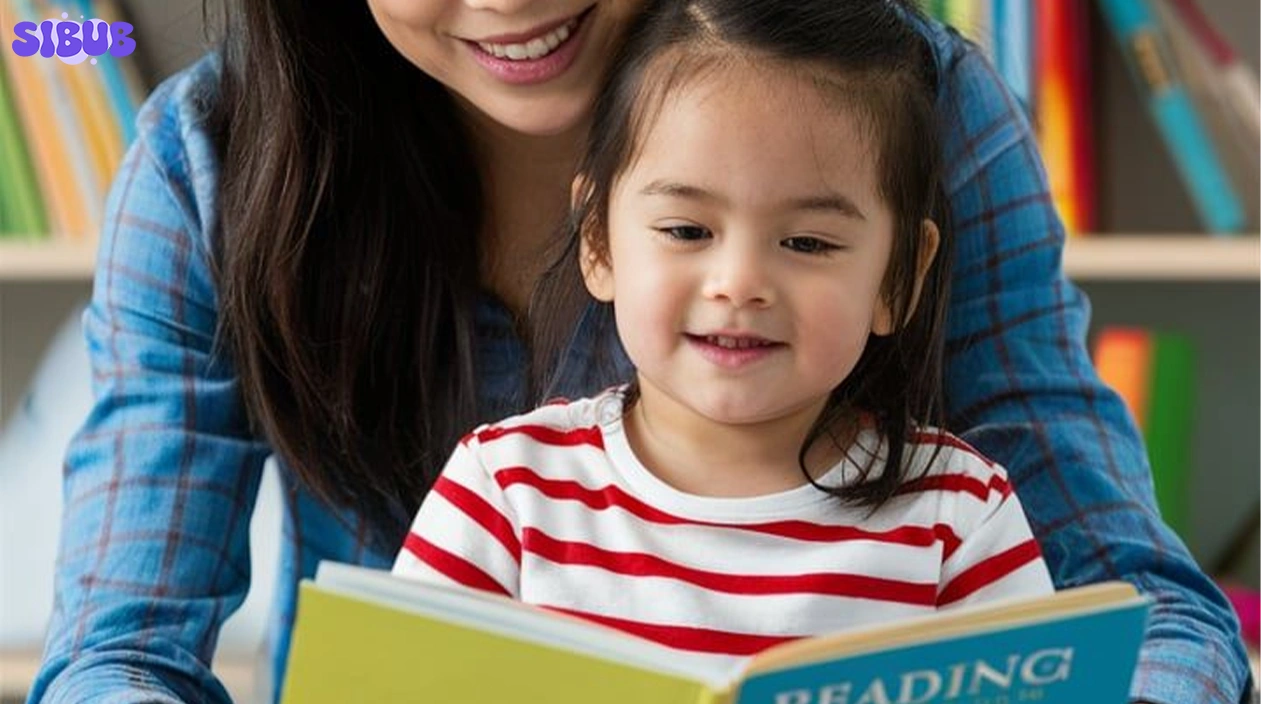Children reading with their parents is one of the most powerful activities for early development.
If you’ve ever thought: Why is it important to read to your little one, the answer goes far beyond just learning how to recognize words. The benefits of reading to children are lifelong. It includes building language skills and boosting emotional intelligence, etc.
In this blog, we’ll explore the importance of reading to children in detail. We will also discover why it matters from the very beginning, and how it creates joyful and educational bonding time for families.
Why Is Reading So Important for a Child?
It may seem simple; you grab a book, sit beside your child, and read aloud. But the effects are deep and lasting.
Why is reading important for children? Because it supports nearly every area of growth:
- Brain development
- Vocabulary building
- Emotional bonding
- School readiness
- Attention span improvement
Even babies benefit from hearing your voice as you read. The act of reading aloud helps form crucial neural connections. According to the Center on the Developing Child at Harvard University, over one million new brain connections form every second in the first few years of life (Harvard University, 2023).

Visit: How to Play Poker: Simple Rules for Beginners
Children Reading: A Simple Habit with Lifelong Results
When you make children reading part of your daily routine, you’re doing far more than telling a story. You’re opening their minds to a world of imagination, new vocabulary, and emotional connection.
In fact, reading to children is one of the most important things you can do to shape their future success; in school, in relationships, and even in their careers.
1. The Impact of Reading on Children’s Cognitive Skills
Reading out loud gives your child more than just a story; it gives them a foundation to think, reason, and problem-solve.
Cognitive development refers to how a child processes the world around them, how they remember, solve problems, and make decisions. Reading stimulates these skills by:
- Expanding memory
- Building reasoning abilities
- Increasing focus and attention
- Developing background knowledge
Children who are addicted to reading too early are better at understanding and making sense of what they see, hear, and read later. They start forming mental connections even before they can speak.
Scholarly Insight: A study published in Pediatrics (2015) showed that children exposed to reading from infancy had stronger brain activity in areas tied to language and visual imagery. (Hutton et al., 2015)
2. Language Growth: A Core Benefit of Reading
One of the most obvious benefits of children reading is how much it helps with language development. From learning new words to understanding grammar, books introduce children to a world of language they wouldn’t otherwise hear.
Conversations are great, but book language is even better for language building. Books use:
- Richer vocabulary
- Longer sentences
- More complex ideas
Why is reading so important for a child? Because by the time they reach kindergarten, kids who are read to regularly will have heard up to 1.4 million more words than kids who aren’t. That’s a massive head start in literacy and communication.

Discover: Authoritative Parenting Style: A Complete Guide
3. The Academic Benefits of Reading
The importance of reading to children becomes crystal clear once they start school. Early readers are more likely to:
- Perform better in literacy and comprehension
- Stay focused in class
- Develop a love for learning
- Score higher on academic assessments
When you read to your child, you’re not just teaching them to read, you’re helping them want to learn.
According to PBS, children who are read to before preschool are more likely to do well in formal education. These early experiences help kids master:
- Phonemic awareness
- Vocabulary
- Comprehension
- Fluency
Reading aloud builds these skills naturally, and you don’t need to teach; just enjoy books together.
4. Stronger Parent-Child Bond
The emotional impact of reading on children is just as powerful as the academic one. Shared reading time gives children a sense of comfort and love. It tells them: “This is our special time together.”
That bond creates trust and emotional security. It helps children feel safe and supported, which in turn helps their social development.
Even reading the same book night after night creates routine and predictability, two things young children thrive on.
Reading also opens the door to deeper conversations. Stories often include characters dealing with big emotions or tricky situations. Use those moments to ask your child how they feel or what they would do.
Explore: How to Play Poker: Simple Rules for Beginners
5. Focus, Discipline, and Patience
Let’s be honest, young kids wiggle a lot. They don’t always sit still or stay focused. But over time, regular reading helps.
One of the surprising benefits of reading to young kids is improved concentration and discipline.
Children learn to:
- Sit quietly and listen
- Follow a story from beginning to end
- Wait for their turn to speak or ask questions
These are the same skills that help them later in the classroom. According to EarlyMoments.com, children reading increases attention span and memory, both essential for school success.
6. Sparking Imagination and Creativity
Books are magical. They transport children to faraway lands, introduce new creatures, and let them live different lives, all without leaving the couch.
Why is reading important for children? Because it fuels their imagination. When a child hears a story, they build pictures in their mind. They dream. They ask, “What if?”
This kind of imaginative thinking leads to creativity in art, writing, problem-solving, and even science. A creative child is more likely to take risks and explore new ideas, important traits for future innovation.

7. Cultivating a Lifelong Love of Books
Reading aloud helps children associate books with pleasure. It tells them: Books are fun. Books are valuable. Books are for me.
According to Jim Trelease, author of The Read-Aloud Handbook, every time you read to a child, “you’re sending a pleasure message to the brain.” That message conditions children to love reading.
And when children enjoy reading, they’re far more likely to do it on their own, not just for school, but for life.
The Importance of Reading in Everyday Life
Reading doesn’t have to be complicated. It doesn’t even have to follow a strict routine. What matters is that your child hears words, sees books, and connects those experiences with joy and learning.
Reading to children while they play, before bed, or even during meals can all count. Some children won’t sit still; that’s okay! Read anyway. They’re still listening.
Pro Tip: Let your child choose books they enjoy. When kids pick the stories, they’re more engaged and excited about reading. Repetition is good too; rereading favorite books helps reinforce language patterns and memory.
Learn More: Why the First 5 Years Matter – How Early Childhood Shapes Who They Become
E-Books or Print? What Works Best?
In today’s world, it’s not always easy to get your hands on physical books. E-books and audiobooks can be a great alternative, especially for families on the go.
But keep this in mind: studies show that parent-child interaction is stronger with print books. There tends to be more discussion, more pointing, and more physical closeness when reading a physical copy.
Still, the most important thing is the act of reading itself. Whether you’re using a screen or paper, what matters most is connecting over the story.
Any Language Counts
Another common worry: “Should I read in English even if it’s not my first language?” The answer is: read in whatever language you’re most comfortable with.
All the benefits of reading to children apply across languages. The vocabulary and thinking skills gained in one language often carry over into others.
As long as you’re talking, engaging, and enjoying stories together, your child is learning.
Scholarly Insight: Bilingual children who are read to in both languages often perform better in language tasks overall. Exposure to rich language in any form is key (Bialystok, 2016).
Final Thoughts: Why Is Reading So Important for a Child?
The answer is simple; because it helps them grow.
- Children reading builds their brains
- It prepares them for school
- It strengthens your bond
- It supports emotional health
- And it sparks joy, curiosity, and creativity
There’s no wrong way to start. Just grab a book, sit down, and read. The importance of reading to children cannot be overstated, it’s one of the best gifts you can give.
Check this out: How to Play Charades: Rules for Kids
Takeaway
Make children reading part of your family’s rhythm. Laugh over silly rhymes. Explore wild adventures. Learn something new together.
Because every story you read today lays the foundation for a smarter, kinder, more curious tomorrow.
